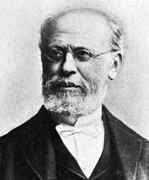Person: Cantor, Moritz Benedikt

Moritz Cantor was a German historian of mathematics.
Mathematical Profile (Excerpt):
- Moritz was brought up in Amsterdam and his early education was from private tutors employed by his parents.
- Given Cantor's fame as an historian of mathematics, we should note at this point that Arneth was an excellent historian of mathematics who wrote the important work History of Pure Mathematics in its relation to the History of the Human Mind (1852).
- There is, however, no sign that Cantor was influenced towards the history of mathematics at this stage in his career.
- After a year at Heidelberg, Cantor went to the University of Göttingen where he spent the years from 1849 to 1851.
- At Göttingen he was taught mathematics and astronomy by Carl Gauss, physics by Wilhelm Weber and mathematics by Moritz Stern, who was particularly interested in number theory.
- Cantor's early work was not on the history of mathematics but he did write a short paper on Ramus, Stifel and Cardan which he presented to a scientific meeting in Bonn.
- He may well have encouraged Cantor to visit Paris which he did in the late 1850s.
- During this visit, which Cantor made shortly after his encouraging Bonn meeting, he became friendly with Michel Chasles and Joseph Bertrand.
- Chasles was an acknowledged leading expert on the history of geometry and encouraged Cantor to publish further historical material in Comptes Rendus.
- From 1860 Cantor lectured on the history of mathematics and became one of the leading German historians of mathematics at the end of the 19th Century.
- Not only did 1863 mark the first important work by Cantor, but it also was the year in which he was promoted to extraordinary professor at Heidelberg.
- Cantor's second book was Euclid und sein Jahrhundert (Euclid and his century) in which he summarised the work of Euclid, Archimedes and Apollonius.
- However, Cantor saw that the Roman surveyors had played an important role in transmitting Egyptian and ancient Greek practical geometric methods to Europe in the Middle Ages.
- Cantor is best remembered for the four volume work Vorlesungen über Geschichte der Mathematik which traces the history of mathematics up to 1799.
- The year 1668 was chosen by Cantor because in this year Newton and Leibniz were just about to embark on their mathematical researches.
- Cantor's 'Lectures on the History of Mathematics' are the work of a man who has unswervingly devoted a life-time to this single task, who thirty-three years ago was well known for his important contributions to this subject, and who can now in the second edition of the first volume of his great work point with pride to the impulse and awakened interest which his endeavours have aroused in the historical studies of his science.
- Nevertheless, it may safely be said that profundity, accuracy, and extensiveness of treatment have never before in any history of mathematics been so thoroughly and intimately united as in the three volumes constituting these Lectures of Moritz Cantor.
- After completing the third volume Cantor realised that, at the age of 69, he was not up to the task of completing another volume, so at the Congress of 1904 in Heidelberg he organised a team with nine further contributors to collaborate on the fourth volume.
- As editor-in-chief Cantor set high standards and insisted that the style and impartiality of the first three volumes be retained.
- And when we say that no less than nine monographs by nine men constitute this fourth volume, it is not surprising to find, that although there is less diversity of treatment than might be expected, yet the volume is not what it would have been had Cantor been able to continue his colossal task.
- Let us note at this point that Cantor was invited to give a plenary lecture at the International Congress of Mathematicians in Paris in 1900.
- Cantor made inquiries about certain American and English mathematicians and spoke of special historical researches then in progress in Germany.
- After a dinner which was served in the garden in the open, the writer, having been told that it was Cantor's habit to lie down after the mid-day meal, departed.
- Moritz Cantor was no relation to Georg Cantor who referred to him as his Namensvetter (cousin by name only).
- Moritz Cantor was honoured with election to the German Academy of Scientists Leopoldina in 1877.
Born 23 August 1829, Mannheim, Baden (now Germany). Died 9 April 1920, Heidelberg, Germany.
View full biography at MacTutor
Tags relevant for this person:
Ancient Babylonian, Ancient Indian, Origin Germany, Special Numbers And Numerals
Thank you to the contributors under CC BY-SA 4.0! 

- Github:
-

- non-Github:
- @J-J-O'Connor
- @E-F-Robertson
References
Adapted from other CC BY-SA 4.0 Sources:
- O’Connor, John J; Robertson, Edmund F: MacTutor History of Mathematics Archive
